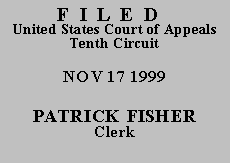

| JIMMIE LEE SCHMIDT, | No. 99-6175
(D.C. No. 99-CV-7) |
Following conviction on four counts of lewd molestation and one count of forcible sodomy, Schmidt was sentenced to fifteen years imprisonment on each count of lewd molestation and twenty years on the count of forcible sodomy, to be served consecutively. He filed an appeal, and the Oklahoma Court of Criminal Appeals affirmed his conviction on June 29, 1995. On April 23, 1997, he filed an application for state post-conviction relief, and on October 9, 1998, the Oklahoma Court of Criminal Appeals once again denied him relief. He then filed a petition for a writ of habeas corpus with the federal district court, on January 6, 1999, pursuant to 28 U.S.C. § 2254. The district court dismissed Schmidt's complaint on the ground that the petition was untimely. Because Schmidt makes no substantial showing of a denial of a constitutional right, we dismiss his request for a certificate of appealability. 28 U.S.C. § 2253(c).
The AEDPA statute of limitations provision, 28 U.S.C. § 2244(d), reads as follows:
(1) A 1-year period of limitation shall apply to an application for a writ of habeas corpus by a person in custody pursuant to the judgment of a State court. The limitation period shall run from the latest of--
(A) the date on which the judgment became final by the conclusion of direct review or the expiration of the time for seeking such review; . . . or
(D) the date on which the factual predicate of the claim or claims presented could have been discovered through the exercise of due diligence.
To avoid a retroactivity problem, we allow habeas petitioners whose judgments became final before April 24, 1996, the effective date of AEDPA, to file their petitions by April 23, 1997. See Hoggro v. Boone, 150 F.3d 1223, 1226 (10th Cir. 1998). In addition, we toll that one-year statute of limitations for any time spent pursuing state collateral review, pursuant to 28 U.S.C. § 2244(d)(2). See id.
In the present case, Schmidt waited until April 23, 1997, to file his application for state post-conviction relief. That was also the last day on which he could file his petition for a writ of habeas corpus. See id. After his application for state post-conviction relief was denied on October 9, 1998, he needed to file his habeas petition within 24 hours to meet the AEDPA statute of limitations. He failed to do so. Instead, he filed on January 6, 1999. Schmidt fails to raise any colorable claim that "the factual predicate of the claim or claims presented" could not "have been discovered through the exercise of due diligence," so as to trigger a later onset of the limitations period. 28 U.S.C. § 2244(d)(1)(D).
Schmidt argues that we should equitably toll the limitations period, but he fails to advance a sufficient cause. See Miller v. Marr, 141 F.3d 976, 978 (10th Cir. 1998). The argument before us is that he was unaware of the applicable AEDPA statute of limitations and of various legal conclusions, e.g., that his counsel had been ineffective. Schmidt thus "state[s] an 'ignorance of the law' defense" to his untimely filing, "a defense which is easily rejected." United States v. Reed, 114 F.3d 1053, 1057 (10th Cir. 1997); see also Woodward v. Sedgwick County Jail Adm'r, No. 96-3202, 1997 WL 31548, at *2 (10th Cir. Jan. 27, 1997) (holding that "the fact that plaintiff may not have discovered the legal basis for his claim until later did not extend the time in which he was required to bring his action"). He also asserts that his attorney's ineffective performance should excuse his untimely filing. "[W]hile [he] alleges that his attorney's mistakes cost him a more favorable result," however, "he has not asserted a substantial claim of actual innocence." Davis v. Madrid, Nos. 99-2119, 98-1306, 1999 WL 811671 (10th Cir. Oct. 12, 1999). "Under these circumstances, we refuse to apply equitable tolling principles." Id. Because Schmidt failed to meet the statute of limitations under AEDPA and has failed to present sufficient grounds for equitable tolling, the district court correctly denied his habeas petition.
A certificate of appealability is DENIED. This matter is DISMISSED.
The mandate shall issue forthwith.
ENTERED FOR THE COURT
Carlos F. Lucero
Circuit Judge
*.The case is unanimously ordered submitted without oral argument pursuant to Fed. R. App. P. 34(a)(2) and 10th Cir. R. 34.1(G). This order and judgment is not binding precedent, except under the doctrines of law of the case, res judicata, and collateral estoppel. The court generally disfavors the citation of orders and judgments; nevertheless, an order and judgment may be cited under the terms and conditions of 10th Cir. R. 36.3.